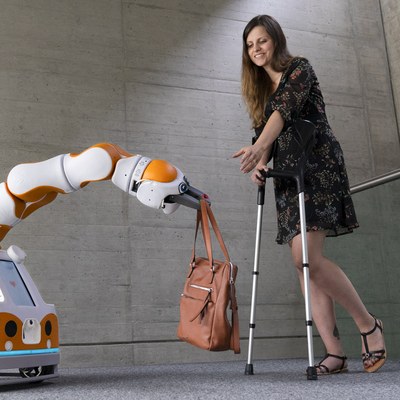Center for Assistive Robotics
 The Center for Assistive Robotics pioneers research in human-robot interaction, specializing in assistive robotics with mobile manipulators. Dedicated to improving the lives of older adults, people with disabilities, workers, and operators in manufactures and industries, the center's research is firmly grounded in social robotics principles and physical assistance, empowering individuals through physical therapy and environment manipulation.
The Center for Assistive Robotics pioneers research in human-robot interaction, specializing in assistive robotics with mobile manipulators. Dedicated to improving the lives of older adults, people with disabilities, workers, and operators in manufactures and industries, the center's research is firmly grounded in social robotics principles and physical assistance, empowering individuals through physical therapy and environment manipulation.
The Center focuses on the development of robots that can rapidly acquire new skills through minimal demonstrations and interactions, leveraging Idiap's expertise in human-robot collaboration, learning from demonstration, and end-user programming. It also draws upon Idiap's expertise in sensing human behavior through social signals and non-verbal cues, encompassing gaze and attention tracking, audio sensing, communication models, and affective computing.
The Center contributes to the Human-AI Teaming Research Program and fosters collaborations across all research groups, bringing together expertise in audio and speech analysis, computer vision, natural language processing, sign-language processing and optimal control to design comprehensive models for interaction analysis and AI models with diverse forms of social intelligence for seamless interactions between humans and robots.
The Center actively engages with stakeholders by co-organizing events with industrial partners and healthcare institutions, fostering collaborations with those seeking to harness the power of embodied AI systems. These collaborations aim to empower workers in manufacturing and agriculture, while also developing systems to assist people with disabilities in performing everyday tasks.
The center support Idiap’s Human-AI Teaming Research Program and AI for Life Research Program.
Selected projects
- INTELLIMAN - AI-Powered Manipulation System for Advanced Robotic Service, Manufacturing and Prosthetics
The main objective of this project is to focus on how a robot can efficiently learn to manipulate in a purposeful and highly performant way. Research domains range from learning individual manipulation skills from human demonstration, to learning abstract descriptions of a manipulation task suitable for high-level planning, to discovering an object’s functionality by interacting with it, to guarantee performance and safety.
- SESTOSENSO - Physical Cognition for Intelligent Control and Safe Human-Robot Interaction
The project proposes a new sensing technology from the hardware and up to the cognitive perception and control levels, based on proximity and tactile sensors embedded on the robot body, providing a unified proxy-tactile perception of the environment, required to control the robot actions and interactions, safely and autonomously. The project is motivated by the industrial need to integrate workers with robots and the need for robots that could operate safely without out-of-the-robot infrastructure, thus reducing robot setup times and costs and increasing the flexibility of the shopfloor configuration.
- SWITCH - Learning by Switching Roles in Physical Human-Robot Collaboration
This project develops technologies for assistive robots to coexist and physically interact with humans. These technologies will enable robots to be more aware of and care about their human partners, with potential impacts on assistance capabilities in healthcare and household environments. The long term goal is to enable humanoid robots to physically interact and efficiently work with humans.
- Collabcloud - Collaborative research infrastructure based on cloud computing
Along ever more extreme computing resource needed for AI research, collaborations are increasingly multidisciplinary, including players with little or no IT expertise, and the demand for openness and reproducibility from the scientific community is growing. In order to boost its future projects, Idiap is building an innovative collaborative research infrastructure based on cloud computing. To demonstrate the potential of this platform, we are also proposing a sub-project to demonstrate the applicability of this system to robotics and, more specifically, human-robot interaction.
Are you interested in the expertise of the center? Schedule a meeting: